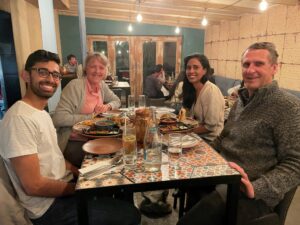Did you know that in the third year of otolaryngology residency, there is a 10-week research rotation to work on academic projects? And that University of Pittsburgh residents go to South Africa throughout the year during their respective research rotations for a total of four weeks each?
They work closely with the Chair of the Otolaryngology Department at the University of Cape Town Johan Fagan, who completed fellowships at the University of Pittsburgh in Otology/Lateral Skull Base and Head and Neck. He founded the African Head and Neck Society and the University of Cape Town’s Karl Storz Fellowship in Advanced Head and Neck Surgery. He is currently the president of the Colleges of Medicine of South Africa (equivalent to the American Board of Medical Specialties). He has also initiated a new medical and dental journal called Journal of the Colleges of Medicine of South Africa (JCMSA), which anticipates going live in July 2023.
This program benefits residents in both cities. For University of Cape Town residents, it establishes friendships with their colleagues from the U.S. For Pitt residents, they “experience otolaryngology practice in a low- and middle-income country (LMIC) setting, delivering excellent care working with limited resources,” Dr. Fagan said. According to Dr. Fagan, LMICs account for 70 percent of the world’s population. “Hence, traveling and experiencing life and medical practice in LMICs is important for U.S. trainees as they are shielded from the challenges and realities that patients and healthcare practitioners face in most of the world,” he said.
They also learn about more advanced disease and do clinical research on different diseases than what they are exposed to in the U.S. As a bonus, they get to interact and befriend residents and fellows who come from all over Africa and beyond, and experience Cape Town and South Africa.
Both Departments have an ongoing collaboration in which the University of Cape Town is regularly invited to Grand Rounds at UPMC and Pitt plans to continue sending residents to Cape Town. “We are also trying to find ways to link faculty and trainees from both institutions either by hosting joint educational conferences, teaching sessions, or discussing interesting and challenging patients,” said Terral Patel, one of the Pitt residents who spent time in Cape Town.
The most memorable part of his experience was making a group of friends including some trainees from the department and students at the university. They all had a favorite food place – a café serving Zimbabwe food called The Meeting Place. Whenever they had time after a day of exploring or hiking, they always went there.
Patel was surprised at how rich in culture South Africa was. “As one of the wealthier countries in South Africa, people from all over the continent come there to work or study,” he said. “The variety of food was also great, and it was such a fun time to make friends and learn about their own traditional foods. The most surprising thing was how beautiful the city and Table Mountain were. I was not prepared for the scenery and the amazingly lush landscape.”

Dr. Fagan said the Pitt residents fit into the system “really well.” Patel said Dr. Fagan and his wife Marion were lovely people and welcoming to all the residents. They went out of their way to make the experience memorable and were so excited to connect. “I can’t thank them enough,” he said.
